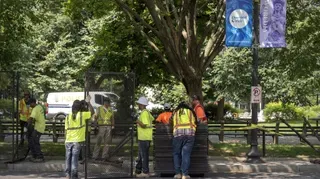October 3, 2013
Pakistan Violence Drives Armored Vehicle Demand
Michael Cox READ TIME: 3 MIN.
Fifteen-foot walls and nearly a dozen armed guards protect Nadeem Khan's palatial home in the most upscale neighborhood of Pakistan's largest city. When it comes to getting around town, though, Khan prefers to travel as low-profile as possible.
Surging violence by criminal gangs and Islamic militants in Karachi has sparked a demand for more armored vehicles to protect wealthy businessmen, politicians and their families.
"I feel safer for myself and my family to travel in an armored car, and it's better than travel with a contingent of security guards in a separate vehicle for people who don't want unnecessary attention," said Khan, vice president of one of Pakistan's largest pharmaceutical companies.
Karachi, a city of 18 million people, has a long history of violence, much of it associated with gangs linked to the city's main political parties. Recent years have been especially bloody. There were 2,174 people killed in Karachi last year, according to the Citizens' Police Liaison Committee, the deadliest year since the organization began collecting figures in 1994.
This year is on track to be even worse. There were 1,894 people killed in the first eight months of 2013, said Ahmed Chinoy, head of the CPLC. The government launched a wide-ranging crackdown in Karachi about two weeks ago using paramilitary forces, but such operations have failed in the past to provide a lasting solution to the violence. Karachi and other cities in Pakistan have also been plagued by deadly attacks from the Taliban and their allies.
Mohammed Khalid Yousuf, head of a company that armors vehicles in Karachi, said rising violence and falling prices for armored vehicles have driven greater demand among the country's elites.
"Previously, only senior government officials and a few leaders of political parties were traveling in armored cars," said Yousuf, CEO of Streit Pakistan Pvt. Ltd, a Canada-based company. "But during the last few years, the law and order situation, especially in Karachi, is turning from bad to worse, and people who can afford it want their vehicles to get armored."
Business has been triple what the company expected, and it is now armoring about 15 vehicles per month, said Yousuf. The company has armored 70 vehicles since it opened shop in Pakistan in January, mostly for customers in Karachi and a few in Islamabad and Lahore, he said.
Khurram Hamirani, head of another company in Karachi, Pak Armoring Pvt. Ltd, also said business was booming. His company has armored 80 vehicles since it began business in early 2012 - mostly Toyota Hilux trucks and Land Cruisers, he said
"Demand is increasing every day, and there is always a waiting list of customers," said Hamirani.
Violence in Karachi has encouraged thousands of businesses to leave and led to millions of dollars in losses. But leaving isn't an option for everyone.
"Every businessman can't shift his family and business abroad or to other parts of the country, and I am one of those" said Khan, the pharmaceutical executive, who recently spent about $40,000 to armor his Land Cruiser. "An armored car not only prevents heinous crimes, but it is also a very effective shield against cell phone snatchers and street robbers."
The only armored vehicles available in Pakistan for years were imported at very high cost and required special government approval. The cost came down significantly several years ago when the government first authorized domestic companies to armor vehicles - although customers still need government approval to carry out the process.
Today, there are at least six companies in the business in Karachi and Islamabad, said Hamirani. It costs $25,000 to $40,000 to armor a vehicle in Pakistan, about half of what it costs to do so abroad and import it into the country, he said. That is still a fortune for most people in Pakistan, a country where many live on just a few dollars a day. Some people still pay more to import armored vehicles because they trust them more, said Hamirani.
Armoring a vehicle involves an elaborate process in which the entire car is dismantled, leaving only the metal skeleton and the engine. Steel plates are then attached to the vehicle using the same welding technology involved in ship construction. Bulletproof windows and special tires designed to resist deflation when punctured are also installed. Workers then re-install the seats, dashboard and other components.
"Unfortunately, failure of the state to provide security has compelled people to take steps for their security," said Hamirani, "and armored vehicles became a necessity rather than a luxury for the people who can afford it."







